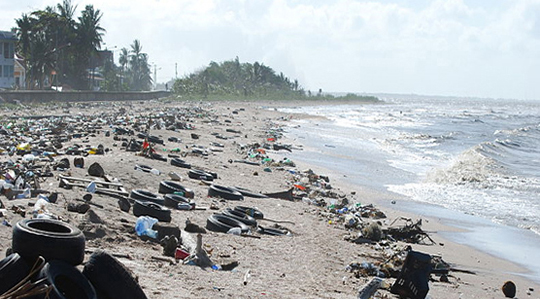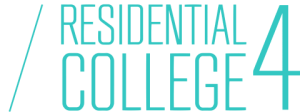Ideas & Exposition Modules
RC4’s curriculum includes academic writing modules titled “Ideas and Exposition”. The I&E modules are offered by the Centre for English Language Communication (CELC).
- Completing the Qualifying English Test (QET) is a pre-requisite for reading I&E modules.
Students who obtain Band 1 will have to take ES1000 followed by ES1103
Students who obtain Band 2 will have to take ES1103
Students who obtain Band 3 are exempted from these English modules and can read I&E I - Students need to read and pass I&E I before reading I&E II.
- Students are awarded letter grades for these modules, with S/U Option.
- View IEM timetable
- IEM FAQ
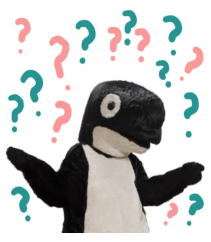
Ideas and Exposition I Offered in AY2022/2023 Semester 1
UTW1001A: Identities and Ideas in Modern Market-Driven Societies
'Innovation,' 'growth' and 'development' are some buzzwords shaping our understanding of social realities. What do they reveal about the values upheld in modern consumer societies? In this module, we examine how themes like competition, self-responsibilization, self-accountability, rational profit-and-loss thinking and the constant impetus towards self-improvement operate as predominant frames in the conduct our daily lives. We explore how the identities and ideas of living in modern market-driven societies are constructed in relation to consumer lifestyles, sport, life-long learning and public housing. Students will develop writing skills enunciating varied points of view and arguments associated with the topics discussed.
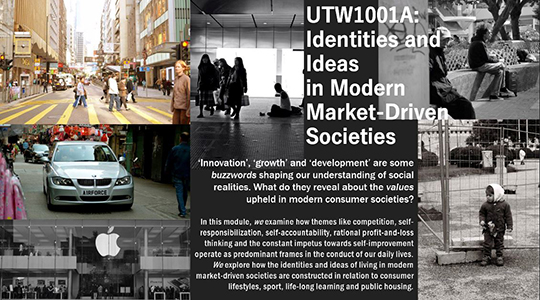
UTW1001C: At the Edges of the Law: Ethics, Morality and Society
What should be the reach of the arms of the law? Most find it unproblematic if a state punishes distributors of child pornography; but what if the punitive muscle of the state is also used to enforce public morality? Can the law intrude on the private lives of citizens? Should euthanasia be legal? In this module we shall be putting these and other pressing issues that are at the centre of political debate to critical enquiry. This module will appeal to students interested in the study of applied ethics, the criminal law, public policy and socio-political theory.
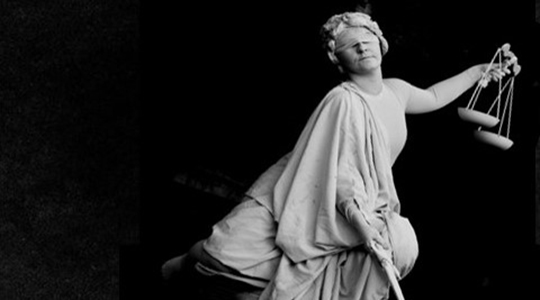
UTW1001D: Self, Society, and the Digital Tsunami era
Cyberbullying, cyber-racism, online falsehoods. These are some of the phenomena that can be observed online. In an era of overwhelmingly diverse viewpoints within social media platforms, how has digital communication shaped and changed the way we communicate and respond to each other as human beings? Have we compromised more than we have gained? Drawing upon perspectives from various disciplines, this module helps students explore how opinions and ideas are formed, debated and transmitted in an age where human interaction is constantly mediated by technology.
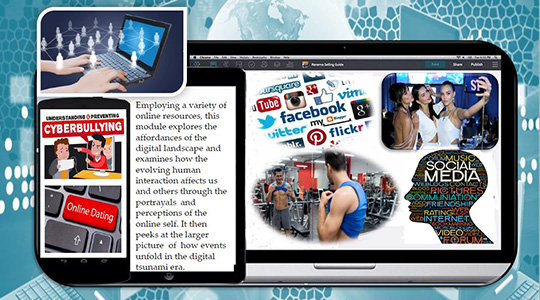
UTW1001F: The Internationalisation of Higher Education: Impact and Challenges
The internationalisation of higher education (IHE) is evident all around us: international students, faculty, researchers; twinning, exchange, offshore programmes; and the list goes on. But amidst the ever-changing landscape, benefits and challenges of IHE (Knight, 2013), how has internationalisation impacted higher education? How have, say, academic mobility and cross-border alliances influenced students, institutions, countries and the world? What are its implications for cultural and academic values? In this module, we will examine the contexts of IHE, compare different case studies in various settings and analyse the controversies of marketisation, language/cultural attrition, global citizenship, etc.
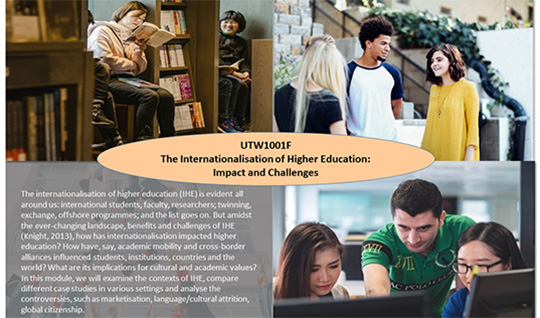
UTW1001H: Eating Right(s): The Politics of Food
Do you know where your last meal came from? Have you ever wondered how your dietary choices affect communities, species and landscapes worldwide? This interdisciplinary writing course examines some human and ecological impacts of contemporary food-related practices and interactions. Readings from different perspectives focus critical attention on industrial agriculture, factory farming, packaging/distribution networks and international trade agreements in relation to issues of hunger, obesity, food security and environmental sustainability. In small collaborative classes, you will examine the strategies used by individual authors to construct persuasive arguments and learn to incorporate these rhetorical skills into your own writing about food.
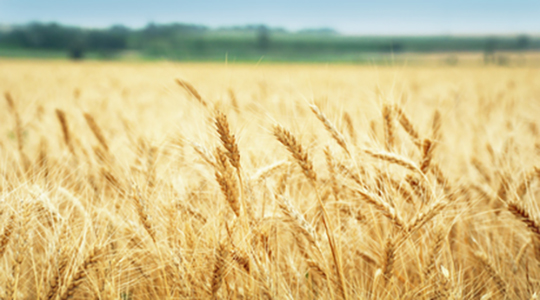
UTW1001I: Science and Popular Narratives
In an era of instant digital mass communication, the scientific and technological ideas disseminated via mainstream news, entertainment, social media and other online platforms may result in the sharing of contagious narratives which are not necessarily consistent with the underlying science. Such narratives can affect public attitudes and behaviour, often with far-reaching social and economic consequences. This course aims to evaluate some of these narratives to enable students to determine the degree to which they represent scientific 'truth'. By the end of the module, students should be in a better position to engage with media representations of science in general.
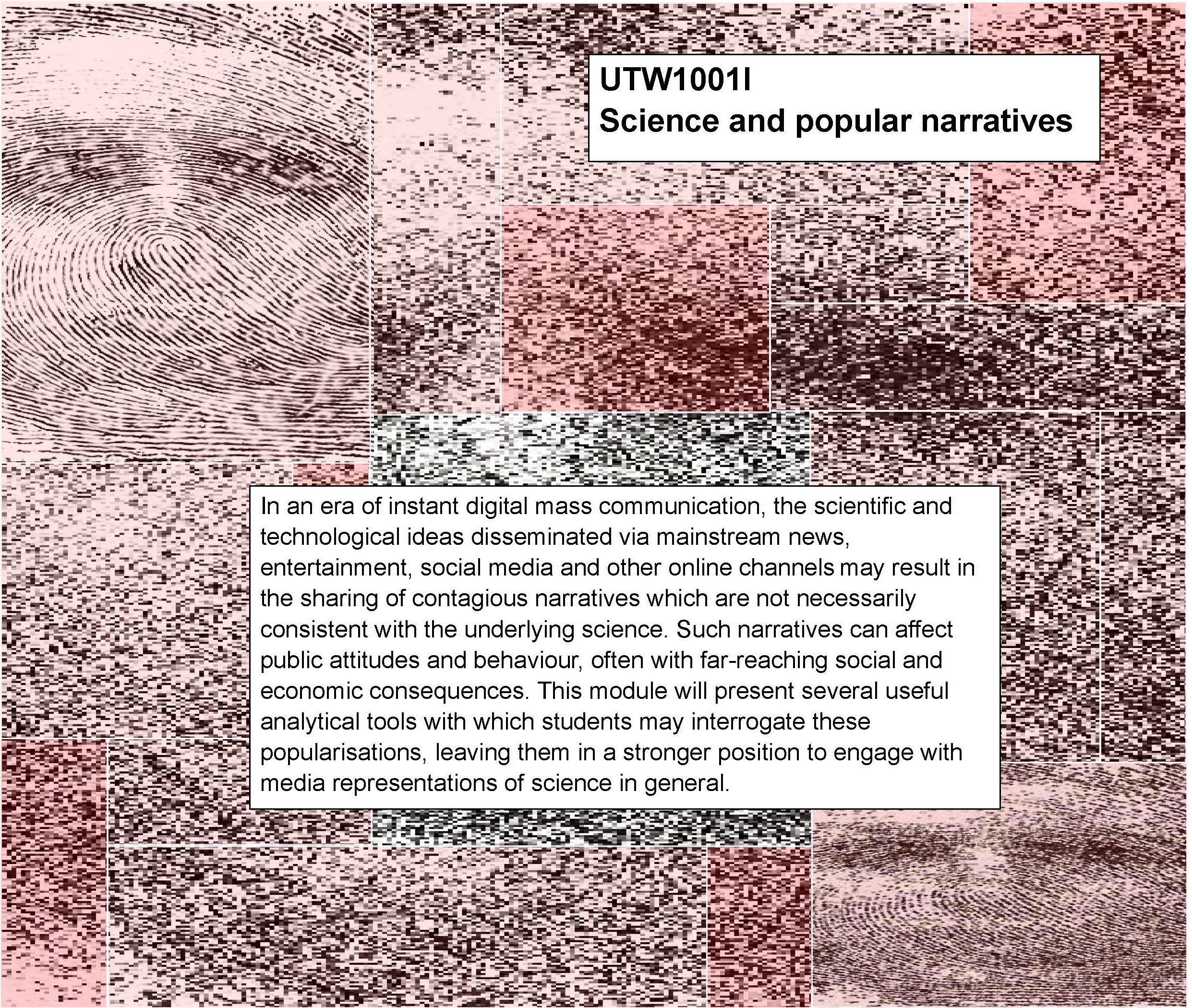
UTW1001M: Sports and competition
In professional, competitive sport, there appear to be fundamentally distinct ideas concerning human endeavour and the nature of competition that are worthy of critical examination. Is winning everything? Should participation or self-defining achievement be more valued? Is sport becoming too elitist? Does the obsession to win create the need for performance-enhancing drugs? Should we legalize doping or tighten control measures? Should we change the nature of professional competitive sport? Students will explore these questions through close analysis of viewpoints expressed in both scholarly literature and popular media, ultimately developing their own positions in written arguments.
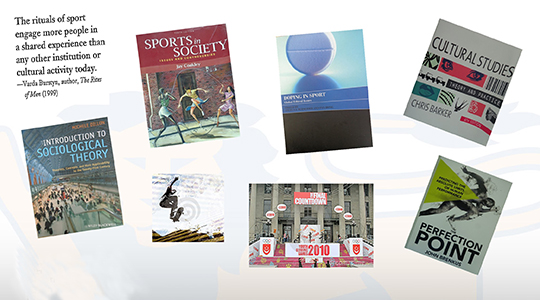
UTW1001O: The Urban and the Wild: Reading Urban Progress in Southeast Asia Ecocritically
In professional, competitive sport, there appear to be fundamentally distinct ideas concerning human endeavour and the nature of competition that are worthy of critical examination. Is winning everything? Should participation or self-defining achievement be more valued? Is sport becoming too elitist? Does the obsession to win create the need for performance-enhancing drugs? Should we legalize doping or tighten control measures? Should we change the nature of professional competitive sport? Students will explore these questions through close analysis of viewpoints expressed in both scholarly literature and popular media, ultimately developing their own positions in written arguments.
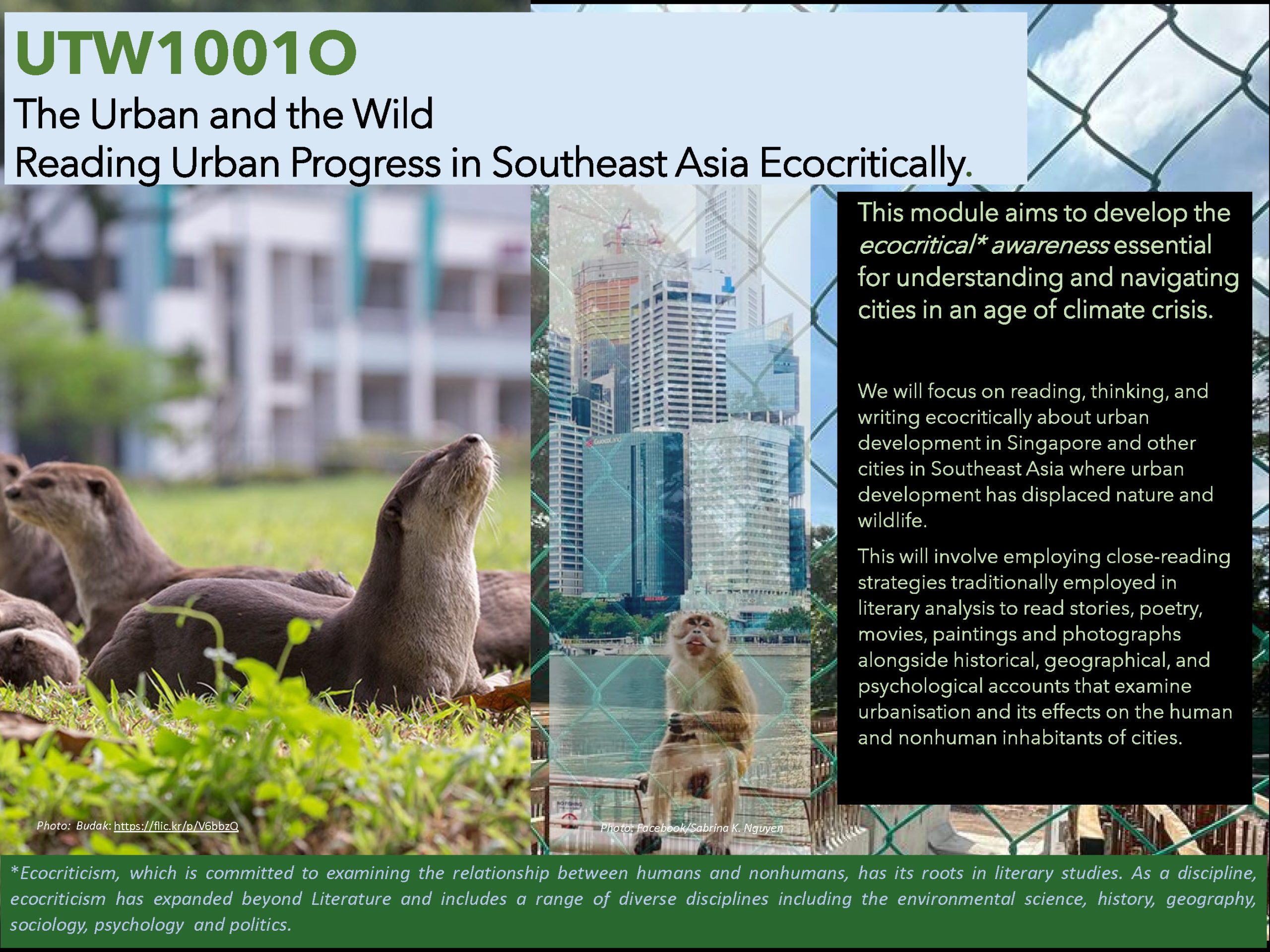
UTW1001Z: Colour: Theory, meaning and practice
Colour has fascinated humans for millennia, yet it is poorly understood. What is the symbolic meaning of colours across cultures? How do colours impact our psychological well-being and our consumer choices? From the earth pigments of the prehistoric painters, to the synthetic colours of the Impressionists, colour technology has developed to meet new communication and expression needs and in doing so, a whole repertoire of meanings has evolved. In this module, students will explore scholarly and popular texts from a range of disciplines including visual arts, fashion, psychology, marketing and anthropology to investigate the theory, meaning and practices of colour.
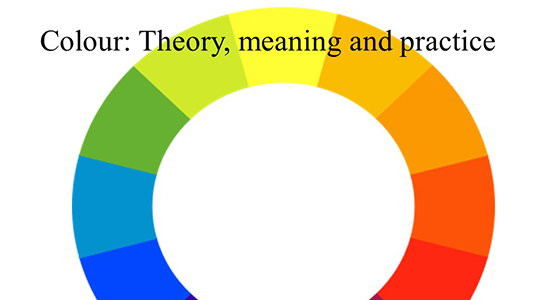
Ideas and Exposition II Offered in AY2022/2023 Semester 1
UTW2001H: Risk and Popular Culture
We live in a time characterized by an intensified awareness of risk. Our perception of risk, whether related to new technology or social activity, is greatly influenced by how mass media represents it. Taking prominent social theories of risk as its critical frame of reference, this course will explore the role of news, television shows, popular fiction and films in shaping public opinion on, and responses to, potential and presumed threats. These range from environmental pollution, pathogens and medical procedures to terrorism, cybercrime, immigration/immigrants and un(der)employment. Case studies may include Fukushima, Chernobyl and the Y2K phenomenon.
